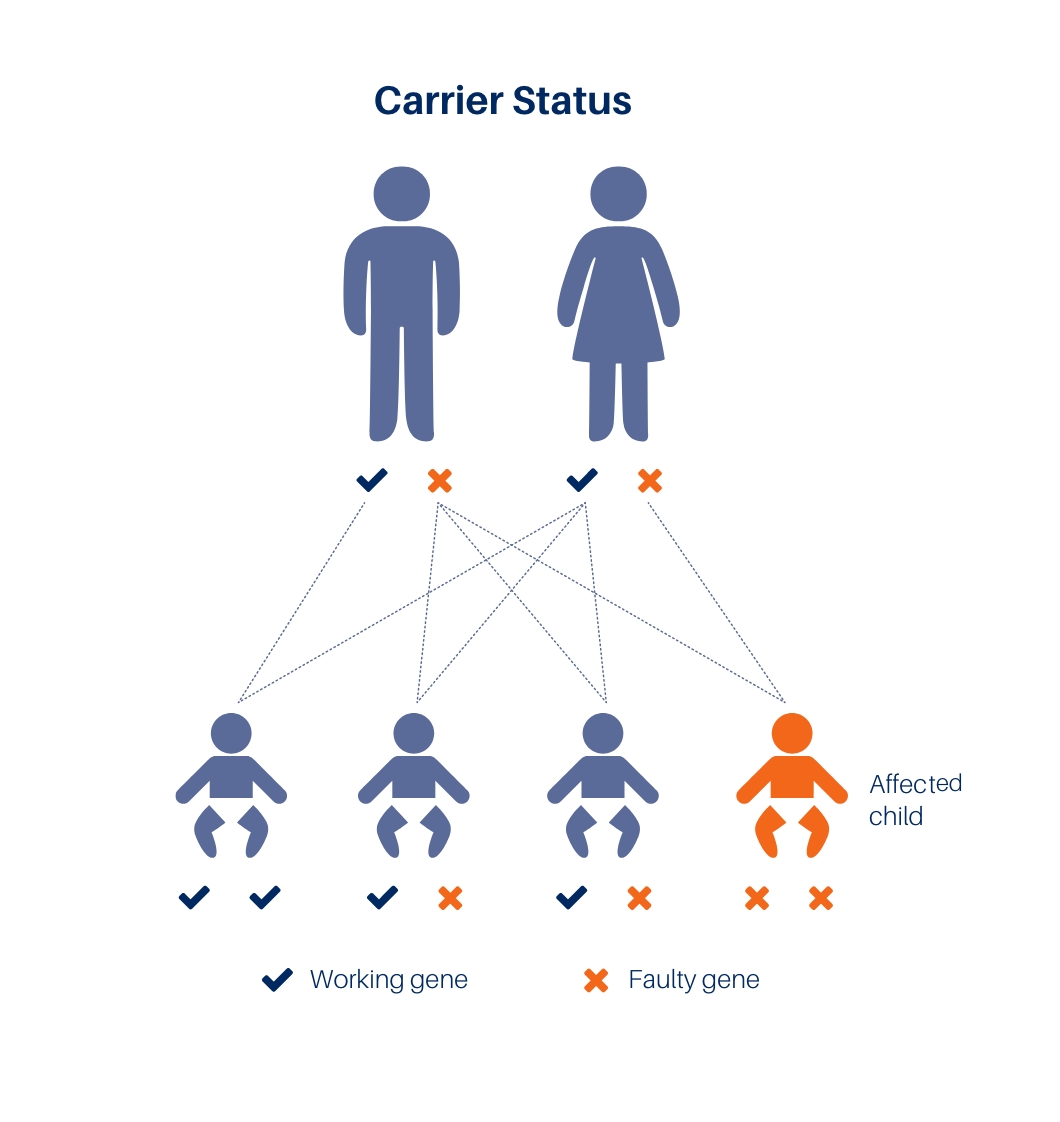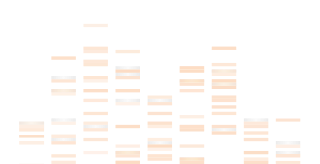The Importance of Reproductive Carrier Screening
Cystic fibrosis, spinal muscular atrophy, and fragile X syndrome, three of the most common familial disorders, affect 1 in 1500 babies1; this is the equivalent to the combined risk of trisomy 18, trisomy 13, and Turner syndrome. Many people have no family history and are unaware they are carriers.
3,000 births
10,000 births
11,000 births

A carrier is a person who has a genetic change, or mutation, in their DNA, but in most cases does not have any associated health problems.
People who are both carriers for the same disorder have a 25% (or 1 in 4) chance of
having a child that will be affected by that disorder.
The American College of Obstetricians and Gynecologists (ACOG) recommends that information about reproductive carrier screening be offered to everyone either prior to conception (preferred) or in early pregnancy.2
The Sonic Difference
End-to-end laboratory partnerSeamless and non-disruptive integration with office workflows | Extensive interface experienceEHR interfaced results delivered securely in an optimized report format |
Conclusive and patient-friendly resultsAvailable through our online patient portal, SonicMyAccess | Best-in-class accessLocal pathology support and access to over 500 patient service centers in the U.S. |
Genetic counselingPost-test sessions with licensed and board-certified genetic counselors | Billing services and price estimatesDedicated care specialist team for patient eligibility, benefits verification, and prior authorization services |
Advanced technology and unparalleled support
Carrier screening identifies patients who are at increased risk of having a child affected with a genetic disorder, providing actionable information for the next steps of their reproductive journey. Our Medical leaders and scientific experts have selected the mutations most relevant to genetic carrier conditions and use cutting-edge technology for the most optimal detection rates.
| Condition | Genes | Risk |
|---|---|---|
| Cystic fibrosis (CF) affects respiratory and gastrointestinal function, resulting in progressive lung disease, recurrent respiratory tract infection, pancreatic insufficiency, and male infertility. | Common mutations in the CFTR gene, responsible for >85% of cases of CF. | A couple can have a child with CF if they are both carriers. When both partners are carriers, they have a 25% risk of having an affected child. |
| Spinal muscular atrophy (SMA) is characterized by progressive symmetric muscle weakness and atrophy that can be complicated by respiratory, orthopedic and nutritional comorbidities. | Deletions of the SMN1 gene, responsible for 96% of cases of SMA. | A couple can have a child with SMA if they are both carriers. When both partners are carriers, they have a 25% risk of having an affected child. |
| Fragile X syndrome (FX) is the most common form of inherited intellectual disability, developmental delay and behavioral abnormalities, including autism. | Expansions of the CGG triplet repeat region of the FMR1 gene, responsible for 99% of cases of FX. | Female carriers are at 50% risk of passing the expansion to their children. The risk of having a child with FX depends on the size of the expansion and the sex of the child (males being more severely affected). Male and female carriers of premutations are at increased risk of tremor/ataxia syndrome and premature ovarian insufficiency (women). |
Increased carrier status detection rates for a broad range of inherited conditions
Sonic offers upgraded universal carrier screening panels. These panels feature next-generation sequencing coverage of 99% of bases at >20x and copy number variant (CNV) analysis for all genes which includes specific recurrent CNVs.3
Ashkenazi Jewish Panel
Screening for individuals of Ashkenazi Jewish descent
Classic Panel
Screens for conditions based on recommendations from ACOG and ACMG*
Basic Panel
The most commonly requested tests
Complete Panel
The most comprehensive screening
* American College of Medical Genetics and Genomic

Genetic Carrier Screening Test Menu
Individual Conditions
■ Cystic Fibrosis 39 ■ Cystic Fibrosis 139 ■ Hemoglobinopathy/Thalassemia ■ Spinal Muscular Atrophy (SMA) ■ Fragile X Screen w/ Reflex Methylation |
Carrier Screening
■ Ashkenazi Jewish Panel, Female (39 genes) ■ Ashkenazi Jewish Panel, Male (37 genes) ■ Basic Duo, Female & Male (CF, SMA) ■ Basic Trio, Female (CF, SMA, FX) ■ Basic Plus Hemoglobinopathies, Female ■ Basic Plus Hemoglobinopathies, Male ■ Classic Panel, Female (24 genes) ■ Classic Panel, Male (22 genes) ■ Complete Panel, Female (157 genes) ■ Complete Panel, Male (147 genes)
|
Testing options may vary per clinical laboratory/pathology practice
* Note that carrier testing of males for FX is not ordered routinely as part of the reproductive carrier screen. If clinically indicated, on the basis of family history or clinical features, FX may be appropriate. Due to the predictive nature of this testing, genetic counseling is strongly recommended.
Testing Procedure
The best time to establish carrier status is prior to conception. However, carrier screening may be performed any time during pregnancy but is recommended as early in pregnancy as possible.

4 Step Testing Process

Test Requisition
Provider completes a genetic carrier and prenatal screening requisition or electronic test request form along with patient consent form. Testing can be performed prior to or during pregnancy.

Sample Collection
Patient’s blood sample can be taken at one of our 500+ patient service centers or within your office. No specialized kits or scheduling is necessary.

Test Results
Patient’s sample is tested and results are reported back to you. Patients can access test results online through our Patient Portal, SonicMyAccessTM.

Genetic Counseling
Patients found to be at high risk of having an affected child will be offered genetic counseling.
Testing can be performed on individuals or couples. There are two options for
carrier testing:

References:
1. Data from: www.cff.org | www.fragilex.org | www.ama-assn.org
2. Carrier Screening for Genetic Conditions. Committee Opinion No.691. American College of Obstetricians and Gynecologists. Obstet Gynecol 2017.
3. www.baylorgenetics.com/news/test-update-geneaware/
Important Test Information:
It is important to note that no preconception carrier screen is able to detect every mutation that might cause a genetic condition. The test does not detect every mutation that can cause cystic fibrosis, spinal muscular atrophy, and fragile X syndrome, or mutations in other genes responsible for other disorders. If no mutation is found, the risk of the patient being a carrier for these conditions is greatly reduced, however the possibility cannot be eliminated. The patient’s ethnicity may also affect carrier risk.

